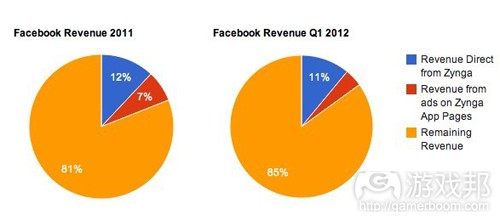每日观察:关注Zynga在Facebook季度收益中占比15%(4.24)
1)据Facebook最近更新的S-1文件资料显示,Facebook在2012年第一季度约有4%收益来自Zynga应用页面的展示广告,还有11%收益直接来自Zynga付款。
也就是说,从1月1日至3月31日,在Facebook的10.58亿美元收益中,Zynga所创造收益占比15%,低于2011年时的19%。但2011年第一季度时Zynga为Facebook创造收益为9530万美元,今年同一时期则是1.1638亿美元(不包括来自应用页面的展示广告)。
Facebook在今年2月份提交文件曾显示,2011年Zynga所创造收益(含虚拟商品交易及广告服务,但不包括用户访问植入第三方广告的Zynga应用页面所创造的间接收益)在Facebook总营收中占比12%。
2)Facebook近日第4次更新的S-1文件指出,Facebook目前共用9.01亿MAU,5亿移动用户。2012年第一季度营收为10.58亿美元,比去年同期增长44.7%,但比2011年第四季度下降6.5%。
如果Facebook要保持目前的盈利率,就需要每年通过每名Facebook用户创收4.69-4.81美元。
在2012年第一季度的10.58亿美元收益中,Facebook营业收入为3.81亿美元,净收益为2.05亿美元;广告收益为8.72亿美元,来自支付及其他渠道的收益为1.86亿美元。国际收益占比49%,超过去年同期的42%,以及2011全年的44%。
Facebook目前共有5.26亿DAU,超过2011年底时的4.83亿。2012年3月份,平均有3.98亿用户至少每周有6天登陆Facebook,该平台在今年第一季度通过每名用户创收1.21美元。
在3月份有8300万MAU仅通过移动平台访问Facebook,而2011年12月时的这一数据仅5800万,增幅达43%。
3)据PaidContent报道,日前有一款名为Privacyscore的浏览器插件上线,它可为用户访问的每个网站隐私安全打分(分值范围介于1-100)。这个工具也适用于Facebook游戏及应用,用户只需安装这个浏览器插件,或者在Facebook找到Privacysocre,输入Facebook应用或游戏名称,就可以查看该应用的隐私安全等级,例如用户《Fruit Ninja Frenzy》目前在Privacyscore的得分就只有50分。
该报道指出,Privacyscore评分功能或将促使Facebook游戏开发商进一步调整游戏隐私安全设置,例如停止向广告商及营销人员发送用户帐号信息等行为。
4)Codemasters日前发布一个在线赛车游戏平台Codemasters Racing,专门负责运营公司旗下的Dirt、GRID和F1等系列赛车游戏,并将于5月25日向其推出首款游戏《Dirt Showdown》。
这种迹象表明,赛车游戏是Codemasters目前的关注重心,该公司最近没有投入开发其他题材的游戏。
据该公司所称,他们还推出了一个在线游戏中心Racenet,其宗旨是面向旗下赛车游戏提供社交游戏体验。(本文为游戏邦/gamerboom.com编译,拒绝任何不保留版权的转载,如需转载请联系:游戏邦)
1)Facebook estimates 4 percent of Q1 revenue came from ads on Zynga app pages, 11 percent from Zynga directly
Brittany Darwell
Facebook estimates that about 4 percent of its first quarter revenue can be attributed to ads displayed on Zynga app pages, according to an updated regulatory filing. An additional 11 percent of Q1 revenue came from direct payments from Zynga.
Although Zynga accounted for 15 percent of Facebook’s $1.058 billion in revenue from Jan. 1 to March 31, that’s a lower percentage than the 19 percent it was responsible for in 2011.
However, in terms of absolute revenue, Zynga directly contributed about $95.03 million to the social network in Q1 2011, while this quarter saw Zynga provide about $116.38 million, not including revenue from ads displayed on app pages.
When the social network first filed for an initial public offering in February, it revealed that the social game company accounted for 12 percent of its 2011 revenue as a result of virtual goods payments and advertising, but it did not include revenue it generated indirectly from users visiting Zynga app pages that include third-party advertisements. Facebook says 7 percent of its total 2011 revenue was generated this way, compared to 4 percent in the first quarter of this year.(source:insidesocialgames)
2)Facebook’s Amended S-1: 901 Million Users, 500M Mobile, Paid $300M Cash + 23M Shares For Instagram
Josh Constine
Facebook has just filed a fourth amendment to its S-1 to IPO that notes that it now has 500 million mobile users, 901 million monthly active users, and that it paid 23 million shares at $30.89 a share plus $300 million cash for Instagram for a total of $1,010,470,000. Facebook also made $1.058 billion in revenue in the first quarter of 2012, up 44.7% from Q1 2012 but down 6.5% from Q4 2011.
So if Facebook maintains its current revenue rate, it would make between $4.69 and $4.81 on each of its 901 million users each year. Read on for more on Facebook’s business, user counts, photos, apps, employees, Instagram, and to see our embed of the full amended S-1.
Of the total $1.058 billion in Q1 2012 revenue, Facebook had an operating income of $381 million, and net income of $205 million. Advertising made up $872 million of the revenue, while payments and other fees accounted for $186 million. International revenue accounted for 49% of total revenue in Q1 2012, up from 42% in Q1 2011 and 44% across all of 2011.
Payments are becoming a larger part of Facebook’s business, with advertising accounting for 82% of business at the end of Q1 2012 compared to 87% at the end of Q1 2011. However, Zynga is becoming less important to Facebook, as the percentage of its revenue derived from that single game developer decreased to 15% from 19% a year ago, as Kim-Mai Cutler details.
Overall, revenue numbers are down from the $1.131 billion in total revenue, $943 million in advertising, and $188 million in payments from the holiday quarter of Q4 2011. The numbers are still way up from the $637 million in ads, $94 million in payments, and total of $731 million total revenue it made in Q1 2011. However, revenue growth rates are slowing, as Facebook increased revenue 88% from 2010 to 2011, but just 44.7% from Q1 2011 to Q1 2012. The cost of revenue for Facebook increased 66% from Q1 2011, the same percentage as its headcount grew.
Despite Mark Zuckerberg noting about the Instagram acquisition that “We don’t plan on doing many more of these, if any at all”, the amended S-1 notes that a lack of similar companies to acquire could actually be a risk: “Our ability to acquire and integrate larger or more complex companies, products, or technologies in a successful manner is unproven. In the future, we may not be able to find other suitable acquisition candidates, and we may not be able to complete acquisitions on favorable terms, if at all.”
Facebook will pay Instagram a $200 million termination fee if government authorities prevent the acquisition from being completed. If Facebook’s shares end up trading at or above the $44.10 price they were moving at in the final SecondMarket auction before the IPO, Instagram’s team and founders could end up with $1.314 billion — much more than the $1 billion quoted for the acquisition.
Other information Facebook now lists for the end of March 2012 compared to the end of December 2011: Facebook collects 300 million photo uploads a day (up from 250 million), hosts 125 billion total friendships (up from 100 billion), sees 3.2 billion likes and comments per day (up from 2.7 billion), hosts 42 million Pages with ten or more Likes (up from 37 million), powers 9 million apps and sites (up from 7 million), owns 774 U.S. patents (up from 56), has pending applications for 546 U.S. patents (up from 503), and has 3,539 full-time employees (up from 3,200).
It will IPO on the NASDAQ. It now has 526 million daily active users, up from 483 million at the end of 2011. In March 2012, Facebook had on average 398 million users who were active on at least six out of the last seven days. On average, Facebook earned $1.21 on each of its users this last quarter.
Its mobile interfaces gained 12 million monthly active users just since March when Facebook listed 488 million monthly users of its mobile products, and now has over 500 million. However, mobile growth is slowing, as it was up 33% from the end of Q1 2011 to the end of Q1 2012, whereas it was up 39% in 2011. 83 million monthly active users accessed Facebook solely from mobile in the month ending March 31, 2012, up a big 43% from the 58 million sole mobile users in the month ending December 31, 2011.(source:techcrunch)
3)How do your favorite social games do on privacy? Privacyscore knows
by Joe Osborne
It’s called Privacyscore, a browser add-on that gives each website you visit a privacy rating on a scale of one to 100. Now, it does just the same for Facebook apps and games, which are notorious for bringing up privacy issues. Privacyscore digs deep into why, say, Fruit Ninja Frenzy has a rating of just 50 when users click on the number that appears next to their browser’s address bar.
All you need to do is either install the browser plug-in or find Privacyscore on Facebook, which allows users to type in the name of any Facebook app or game and see its privacy rating.
Unfortunately, the service doesn’t provide much more than a score and some reasoning behind the score, but in some cases that could be all that’s needed to make a change.
PaidContent points out that a low Privacyscore rating could shame certain Facebook game developers into making changes to their game, like putting a stop to pawning your account information to advertisers and marketers. Are you still going to play Fruit Ninja Frenzy or Mindjolt Games regardless of their low privacy rating?
Probably, but at least now that skeleton is out of the closet. We couldn’t have put it better than paidContent’s Jef John Roberts: “This education may help consumers and politicians move beyond privacy hysteria and accept a basic fact: personal information is a commodity used to pay for access to free online services like Facebook.”(source:games)
4)Codemasters turns focus purely to racing games, launches social hub
by Mike Rose
Racing game specialist Codemasters has launched a new label within the publisher that will focus solely on racing titles, along with a new online racing gaming hub.
Codemasters Racing will house the company’s Dirt, GRID and F1 franchises, with upcoming Dirt Showdown the first title to be released from the new studio on May 25.
The formation of this new label marks Codemasters move to focus solely on racing games, with no games currently in development under other genres. “Racing is the absolute razor focus for all titles currently in development and those slated for future development across the studios in Warwickshire and Birmingham,” the company told Gamasutra.
“The focus is an exclusive one, there are no other genre properties in development at this time; racing is everything. We are also increasing headcount across the operation, which currently employs around 700. We are expanding the teams by a further 100+ development positions, which are opening over the course of the year across the sites.”
The company is also launching an online gaming hub called Racenet, with the aim to provide a social gaming service specifically for its racing games.
An open beta for the service will launch alongside the release of the Dirt Showdown demo, and will gives users a profile on which they can check the rewards they have received from the various Codemasters racing games, and challenge friends.
The move continues Codemasters’ shift away from genres outside of racing, as it closed its Bodycount studio late last year.(source:gamasutra)










































 闽公网安备35020302001549号
闽公网安备35020302001549号